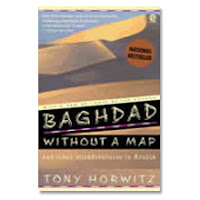Tony Horwitz is the author of six books, including Confederates in the Attic, Blue Latitudes, and his most recent, Midnight Rising: John Brown and the Raid That Sparked the Civil War.
Q: Why did you decide to write about John Brown and his raid
on Harpers Ferry, and was there anything in particular in the course of your
research that surprised you about him?
A: I’ve always been intrigued by John Brown and Harpers
Ferry, but when I began doing some research I was stunned by how much of the
story I didn’t know. For instance, the cast of characters apart from Brown
includes Frederick Douglass, Henry David Thoreau, Robert E. Lee, John Wilkes
Booth, and a radical underground of young idealists. I wanted to get inside
their heads and understand how they and the nation were propelled towards
violent conflict.
One of the many surprising things I learned about Brown was
that for most of his life he was a clean-shaven family man and entrepreneur—in
essence, a fairly conventional American on the make. Imagining him, as we often
do, as a fringe character, driven by madness or religious zealotry, makes it
easy to dismiss Brown as a crazed lone gunman. In reality, he was
representative of his times, and radicalized by them. His life is a window into
the country at large and its decades-long plunge towards civil war.
Q: One of your best-known books is Confederates in the
Attic, which also focuses on the Civil War. What about that conflict intrigues you,
and do you plan to write about it again?
A: I’ve been a Civil War nerd since boyhood, when my father
read me books about the conflict and took me to battlefields. As I got older,
my interest shifted towards the issues at stake in the war, race in particular.
Also, I can never get enough of the writing and photographs from that period.
The Revolution seems very distant to me; not so the Civil War. I can walk a
battlefield in Virginia, read letters, or stare at sepia images of young
soldiers and feel instantly transported to the America of 150 years ago. It’s
time travel to an era that’s still very relevant to our own.
I don’t have plans to write another book about the Civil
War—there are enough volumes on the subject already! But I may revisit the pre-war
period I explored in Midnight Rising. As a nation, we tend to obsess on the
1861-1865 drama, the great battles and leaders. I’m now more drawn to probing
the conflict’s roots and the question of how Americans came to slaughter each
other by the hundreds of thousands in the first place.
Q: Of all the places you've been over the years as you've
researched your books, are there some that really stand out in your mind as
especially fascinating?
A: My writing has taken me to about 40 countries, so it’s
hard to choose. Yemen may be the wildest and weirdest land I’ve visited. The
landscape seems out of Arabian Nights—mud towers, jagged mountains, baked
desert, labyrinthine bazaars—and Yemenis are both ferociously armed and
pleasantly addled by qat, a mildly narcotic leaf. I felt stoned there, even
when I wasn’t. Not the safest place on earth, but certainly among the most
exotic.
Outback Australia also stands out. When I hitchhiked across
it, 25 years ago, the harsh empty landscape felt lunar, and the people almost
as alien. Drivers measured distance in the number of beers consumed en route;
i.e. a hundred-mile stretch was “about a six pack.” And Aboriginal culture is
the most ancient and profoundly non-Western I’ve encountered. I felt very far
away, as in Yemen.
Q: Your wife, Geraldine Brooks, is also a writer--do you
discuss your writing with each other as you're working on your books?
A: We write at desks about 10 feet apart, and have for most
of the past 28 years. We consult on ideas and sentences and metaphors
throughout the day, and edit every line of each other’s work before anyone else
sees it. So it’s hard to separate our marriage from our writing. That being
said, like most couples, we devote 90 percent of our conversation to such lofty topics
as, “who’s meeting the schoolbus?,” “has the dog been fed?,” or “did you pay
the Comcast bill?” The Iowa Writers’ Workshop it’s not.
Q: What are you writing now?
A: At the moment I’m writing magazine stories, principally
on historical topics for Smithsonian, and noodling on a next book project. But
I haven’t committed to anything yet. A book is a long-term commitment and I
need to be sure I’m truly in love with a topic before I tie the knot.
Q: Anything else we should know?
A: I’ve written six books and it never seems to get easier.
Many people imagine writing as a romantic craft, but for me at least, it’s
about getting your butt in the seat for as many hours a day as you can and
piling one word on top of another, whether you feel inspired or not. The best writing
advice I ever got was from Judith Viorst, the most disciplined and hard-headed
author I know. As she put it: “When there’s no wind, row.”
--Interview with Deborah Kalb







No comments:
Post a Comment